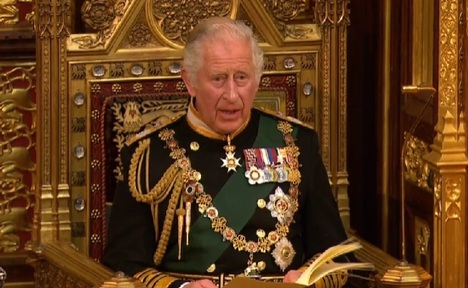Queen's Speech unveils mental health reform to end learning disability detentions
Prince Charles stood in for his mother to read out the Queen’s Speech and announced a draft mental health reform bill to stop the detention of people solely because they have learning disabilities or autism.

Campaigners have been concerned about people with learning disabilities and autism who can be detained in hospital under the 1983 Mental Health Act, even if they do not have a mental health condition. One reason for the delayed transfer of care is a lack of care in the community.
People detained solely because of learning disabilities or autism
The Queen's Speech (which is written by the government and sets out its legislative agenda for the next parliamentary session) announced 38 bills and draft bills on the State Opening of Parliament, including proposals for mental health reform.
The Queen’s Speech was delivered by Prince Charles from the House of Lords throne, after the Queen cancelled her attendance because of mobility issues.
The draft bill for mental health reform aims to reduce the number of people detained under the 1983 Act. The government said its proposals would give people greater control over their treatment and reduce the use of hospital care for autistic people and those with learning disabilities.
The proposals will include changing the definition of a mental disorder to ensure people can no longer be detained solely on the basis of being autistic or having a learning disability. They would have to have a co-occurring mental health condition.
At the moment, those with a learning disability can be detained if this is “associated with abnormally aggressive or seriously irresponsible conduct”. Autism is classed as a “mental disorder” under the Act.
The proposals would also change the criteria for detention so that the act’s powers can only be used if there is “genuine risk to [the person’s] own safety or that of others, and where there is a clear therapeutic benefit”.
The proposals would also introduce a statutory care and treatment plan for everyone in detention, which will be written with input from them and set out a clear route to discharge from hospital. Keir Starmer promises mental health treatment within 4 weeks

The end of the Queen’s speech marked the start of the new parliamentary session and launches six days of debate about the speech.
In the House of Commons that afternoon, MPs debated the draft laws proposed by the government and a vote will be held in the Commons to approve the agenda.
Prime Minister Boris Johnson said the infamous ‘F’ word again when he reminded MPs of his efforts to ‘Fix’ social care - a pledge he originally made on his first day as Prime Minister. Mr Johnson said the government is “giving the confidence that people know that they will be looked after in old age by fixing social care”.
A government white paper on mental health reform has already promised to ‘deliver parity between mental and physical health services and put patients’ views at the centre of their care’.
The government has stated its measures will ‘tackle mental health inequalities including disproportionate detention of people from black, Asian and minority ethnic communities’. Labour leader Keir Starmer said the country needed a government “that would finally deliver world-class mental health provision that matches years of empty rhetoric on parity with physical health”.
Mr Starmer instead promised Mr Johnson that Labour would hire new clinicians “so we can guarantee mental health treatment in four weeks”.
New act ‘won’t be enough’
Responding to the Queen's Speech, Miriam Deakin, the director of policy and strategy at NHS Providers, said: "Reform here is long overdue and we are pleased, as we mark Mental health awareness week, that this is a priority for the government.
"We support proposed changes to the act that will give people a greater say in planning their care and recovery. A new Mental Health Act on its own won't be enough to guarantee high-quality mental health services or transform the way we deliver them for years to come.
"COVID-19 has left a significant legacy on the nation's mental health, particularly for children and young people, and the effects of poor mental health are expected to last longer than in some other areas of care.
"The pandemic has taken its toll on overstretched NHS staff too, with the soaring cost of living now adding more pressure.”
Latest News
 29-Jul-24
Dementia Bus gives carehome.co.uk staff insight into life with dementia
29-Jul-24
Dementia Bus gives carehome.co.uk staff insight into life with dementia
 27-Jul-23
UK's top home care agencies in 2023 revealed
27-Jul-23
UK's top home care agencies in 2023 revealed
 30-Nov-22
A quarter of older people keep their falls secret from family
30-Nov-22
A quarter of older people keep their falls secret from family
 29-Nov-22
'Covid-19 has not gone away' say terminally ill
29-Nov-22
'Covid-19 has not gone away' say terminally ill
 28-Nov-22
IT consultant who received poor care opens 'compassionate' home care business
28-Nov-22
IT consultant who received poor care opens 'compassionate' home care business